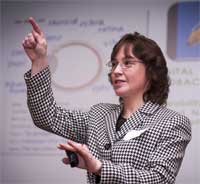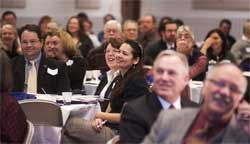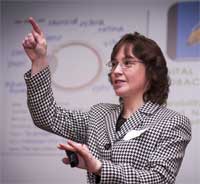 KINGSTON, R.I. – January 22, 2013 – Do you know what gesture-based computing is? Are you familiar with the concept of “the internet of things?” What about geo-social gaming?
KINGSTON, R.I. – January 22, 2013 – Do you know what gesture-based computing is? Are you familiar with the concept of “the internet of things?” What about geo-social gaming?
If not, get familiar with them quickly, especially if you’re an educator who wants to keep pace with young people functioning in these realms nearly every second of their waking and even somewhat drowsy lives.
While living in those worlds, middle school youngsters are asking serious questions and making such points as “Why can’t we use a computer every day?” “Imagine you are a CEO at IBM, and you can only use a computer once a week.” “We like to do more projects because it shows our creative side.”
These were among some of the riveting topics and issues covered by Julie Coiro, URI assistant professor of education, during the first keynote talk last week at the University of Rhode Island’s fifth annual daylong Academic Summit, “The Future of Learning.” More than 200 faculty and staff members participated in lectures, workshops and discussions. To see a video of Coiro’s full talk, the research she cited to develop her discussion and the full PowerPoint presentation, go to http://2013uriacadsummit.wikispaces.com/
By the way, gesture-based computing uses the hand or finger to direct a computer, instead of using a mouse or touch screen to accomplish the same task. The Internet of things is a concept that involves connecting everyday physical objects to the Internet so they can communicate information to other devices. And finally, geo-social gaming involves online gaming through mobile phones using social networking and geo-tagging technologies.
 In her discussion, “Engaging Tomorrow’s Learners Today: Digital Trends, Learner Preferences & Next Steps,” Coiro described five key trends shaping higher education practices:
In her discussion, “Engaging Tomorrow’s Learners Today: Digital Trends, Learner Preferences & Next Steps,” Coiro described five key trends shaping higher education practices:
• People expect to work, learn and study anytime, anywhere.
• Work demands digital and personal collaboration, with an emphasis on process, product and multiple perspectives.
• There is a new emphasis on challenge-based and active learning.
• A shift to hybrid learning models that combine virtual with in-person learning where students can connect with each other and their professors in class or out of class.
• Roles must be revisited in the context of access to online information and relationships to best meet the needs of today’s learners.
Coiro played a provocative video, titled, “Having Our Say,” which highlights key findings from of a study of 4,000 North Carolina middle school students who offered their perspectives on school, technologies, and academic achievement. As the video begins, students ask, “Do you know us?”
One student said jobs in the future would require constant computer use, so why can’t students use a computer every day?
“There are so many restrictions, don’t play music, don’t use your phone. Don’t play that game,” another said.
“School needs to change for us.”
Another student added at the end of the video, “You can figure this out. They have already figured this out in China and India.”
“That is the age group of students that I work with, in addition to the URI students I teach here,” Coiro said.
Again pointing to research, Coiro said students say that doing is more important than knowing, and so collaboration, discussion and action are central. They prefer trial and error approaches to problem solving, and they demand immediacy and thrive on multitasking. Students also have a low threshold for boredom and shorter attention spans.
“This is about real life,” Coiro said, “and all of these factors have a huge impact on teaching, learning and effective use of technology.”
Referring to a chart that depicted the strengths and weaknesses of today’s students, Coiro said questioning of established procedures, friendliness to all ages, trust, lack of prejudice, flexibility and energy are strengths for this group. Weaknesses may include a lack of financial management skills, self-awareness, self-management, the ability to accept criticism, and performance in written English.
“How has the digital revolution transformed education in the United States and has our own teaching kept up?” Coiro asked.
She said the nation is entering a new era of lifelong learning. “Technology provides the opportunity, but will we embrace it, fight it, or ignore it?”
Coiro then asked URI faculty members, “What is your role in preparing today’s students to be lifelong learners in a digital age and how well are you meeting the education demands in this era of lifelong learning?”
Coiro said teamwork among faculty members is critical because not everyone knows all the answers. She added that digital trends would play a large role in teaching and learning and that rather than fight them, teachers must capitalize on the strengths of today’s learners and address areas of need.
“We must re-design our teaching practices in the context of today’s rigorous expectations and important challenges while we monitor and improve our own abilities to meet changing demands in the era of lifelong learning.”
Pictured above
TIPS ON HOW TO KEEP UP WITH TODAY’S LEARNERS: Julie Coiro, URI assistant professor of education, speaks during the first keynote talk last week at the University of Rhode Island’s fifth annual daylong Academic Summit, “The Future of Learning.” URI Marketing and Communications photo by Michael Salerno.

